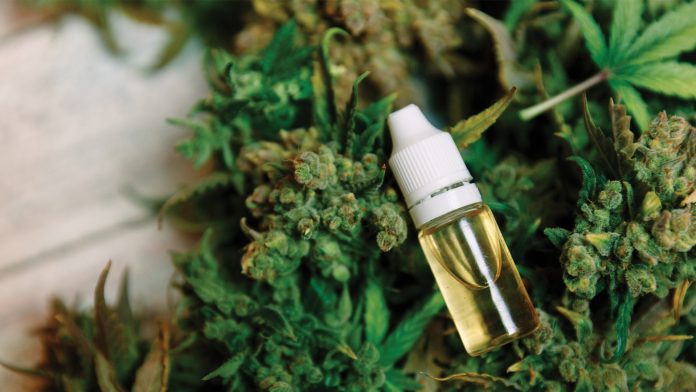
The Cannabis Act could lift the lid on research into cannabis as a performance-enhancing drug now that more athletes are opening up about using cannabis in sport.
The medical effects of cannabis in sport and exercise are largely unknown. Given developing attitudes towards the drug and change in legislation in many different countries, it is vital that more cannabis research is done in order to inform policy in both government and sports.
We continue to discover more about the endocannabinoid system since its discovery in the 1980s, and the question of whether cannabis in sport can be classed as an ergogenic or an ergolytic drug still rages. On the one hand, many believe ingesting the plant can improve performance, help athletes to focus and contribute to managing pain; on the other hand, some claim that using cannabis can decrease motivation – including the motivation to train or push oneself – decrease oxygen intake and decrease reaction times. However, the pharmacokinetics of the THC compound in particular can cause complications when studying the adverse analytic findings.
Cannabis has a long history with sports, and across the globe many top athletes have, and still do, turn to cannabis to help them focus on the moment, relax and aid recovery following sports injuries.
Research into cannabis in sport
The introduction of Canada’s Cannabis Act means that more research regarding cannabis in sport can now be conducted; however, several papers that discuss the effects of the drug during sports have already been published that can give us an insight into why athletes use cannabis and the effects it has on their performance. More research also needs to be done into the effects of the congestion of food stuffs containing traces of cannabinoids, such as CBD oils or energy balls, and whether this has any effects on athletes’ performance as opposed to smoking the plant or ingesting THC cannabis-based products.
A study conducted in France in 2002 showed that 1,152 sports students used cannabis during their training and sports activities in order to increase their sportive performance and showed that it was men who were much more likely to incorporate the use of cannabis into their sport activities.1 Another study conducted in 2003 found: ‘As a whole, practising sports as an elite student‐athlete can be considered as correlated negatively with cigarette, alcohol and cannabis use. Nevertheless, this relationship depends on the kind of sport practised as well as the level of competition, and further research is needed to understand specific elite athletes’ motives for use’.2
Published in the British Journal of Sports Medicine, a 2006 study looking at what was known at the time about cannabis in sport noted that: ‘Renaud and Cormier showed that marijuana smoking reduces maximal exercise performance; when 12 healthy young adults cycled to exhaustion 10 minutes after smoking, exercise duration decreased from 16 to 15 minutes.
Driving and piloting skills are also negatively affected and point to the dangers of cannabis exposure when high levels of alertness and quick reflexes are required, such as in automobile sports. Thus, it can be inferred from the psychological effects of marijuana that cannabis is effective only in allowing an athlete to relax and to escape from social pressures.’3
More recently, one of Canada’s most prominent brain injury experts, neurosurgeon Dr Charles Tator at Toronto Western Hospital’s Canadian Concussion Centre, noted he was hopeful that research into cannabis could benefit those suffering from post-concussion problems after it was announced that 100 NFL players would be taking part in a randomised, double-blind study into the effects of cannabis on those who have suffered such injuries.
Anti-doping agencies and regulations in sports
As governments relax policy around cannabis some sport bodies are also taking a more progressive and relaxed attitude towards athletes using the drug in their respective sports – namely, USA Basketball BIG3, the NHL, and Major League Baseball. However, some cases of use in sport still result in a suspension, sometimes of up to two years, if found in the system.
Controversy over the detection of cannabis compounds in urine is a matter for consideration regarding regulation considering both THC and CBD can be detected in the urine of regular users for anything from four weeks to three months since their last use of the drug: ‘Quantitation of carboxy‐THC in urine alone cannot predict time of last marijuana use or suggest any relation between urine concentration and psychomotor effects.’3
The World Anti-Doping Agency (WADA) has included cannabis on their Prohibited List, saying that it is a performance-enhancing drug, a potential health risk and a violation of the spirit of sport. However, others say that the drug only enhances performance in the same way a healthy diet does – it is not the same as injecting something that can increase muscle mass or enlarge red blood cells and therefore increase the amount of oxygen carried around the body.
Athletes turning to cannabis for medicine and enhanced performance
Cannabis has over 400 chemical entities – 60 of which are cannabinoid compounds which directly act on our neurotransmitter endocannabinoid system. The difference between these compounds, namely CBD and THC, and their effects on performance is a pressing matter for sports bodies, athletes and scientists; however, the amount of research and studies done into the different effects of these compounds is extremely limited.
Endocannabinoids regulate appetite, emotions and memory, and the analgesic properties of cannabis means that more athletes are turning to cannabis as an alternative to pain killers. Whilst some athletes have been using CBD-based products to aid recovery and relieve pain and stress, others use products high in THC in order to increase their focus and performance.
Cannabis also regulates fatigue and so can relieve physical and mental exhaustion, making it a go-to drug for athletes looking for relief from intensive training regimes. The option for athletes to consume edibles rather than smoke the plant also means they can reap the benefits without the harmful effects of smoking.
Several Canadian athletes have been embracing the healing properties of CBD for a number of injuries and ailments. Toronto-based Muay Thai fighter Angelina Musicco suffered injuries from competing and turned to cannabis after being prescribed numerous pain killers, and Montreal-based former mountain biker Phil Dépault did the same after being diagnosed with fibromyalgia, both launching their own cannabis-based products businesses that include edibles and topicals following their successful use of the plant for its medicinal properties.
In Canada and America, a number of sporting initiatives set up by amateur and professional athletes similarly aim to incorporate the use of cannabis in sport and training such as the 4/20 games, Cannafit and NORML Athletics.
References
- www.ncbi.nlm.nih.gov/pmc/articles/PMC3717337/
- https://onlinelibrary.wiley.com/doi/abs/10.1046/j.1360-0443.2003.00490.x
- www.ncbi.nlm.nih.gov/pmc/articles/PMC2657492/
Please note, this article will appear in issue 9 of Health Europa Quarterly, which will be available to read in April 2019.


















